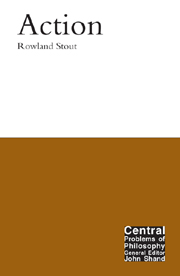Book contents
- Frontmatter
- Contents
- Acknowledgements
- 1 Introduction: inward-looking and outward-looking approaches to agency
- 2 Acting for a reason
- 3 Reasons and passions
- 4 Agent causation
- 5 Mental causation
- 6 Deviant causal chains and causal processes
- 7 Acting with an intention
- 8 Prior intention
- 9 The metaphysics of action
- Conclusion
- Notes
- Suggestions for further reading
- References
- Index
4 - Agent causation
- Frontmatter
- Contents
- Acknowledgements
- 1 Introduction: inward-looking and outward-looking approaches to agency
- 2 Acting for a reason
- 3 Reasons and passions
- 4 Agent causation
- 5 Mental causation
- 6 Deviant causal chains and causal processes
- 7 Acting with an intention
- 8 Prior intention
- 9 The metaphysics of action
- Conclusion
- Notes
- Suggestions for further reading
- References
- Index
Summary
Action as a causal concept
Whether the concept of action is a causal concept is a philosophical question that seems so far removed from any real concerns that it may be hard to drum up any interest in it. It is tempting to say “Yes, it obviously is; and so what?” But in fact it is not obvious; and it is important. The answer to this question effectively determines the structure of one's whole approach to the philosophy of action. If the answer is yes, then we have to work out how to characterize the causal nature of action, and by doing this will have moved a long way towards understanding what action is. If the answer is no, then there is a real challenge about where to go from here. How else can we analyse our concept of action; or is it in fact unanalysable?
Action involves transforming the world in certain ways. As such the idea of action appears to be the paradigm of a causal idea. The action of turning on a light involves making the light go on. The action of writing a book involves making a book get written. So it appears that whenever an agent acts they make something happen. One thing making something else happen is the same as one thing causing another to happen. So action seems to be a causal concept; to say an agent is acting is to say that they are causing some result to be achieved.
- Type
- Chapter
- Information
- Action , pp. 53 - 68Publisher: Acumen PublishingPrint publication year: 2005



